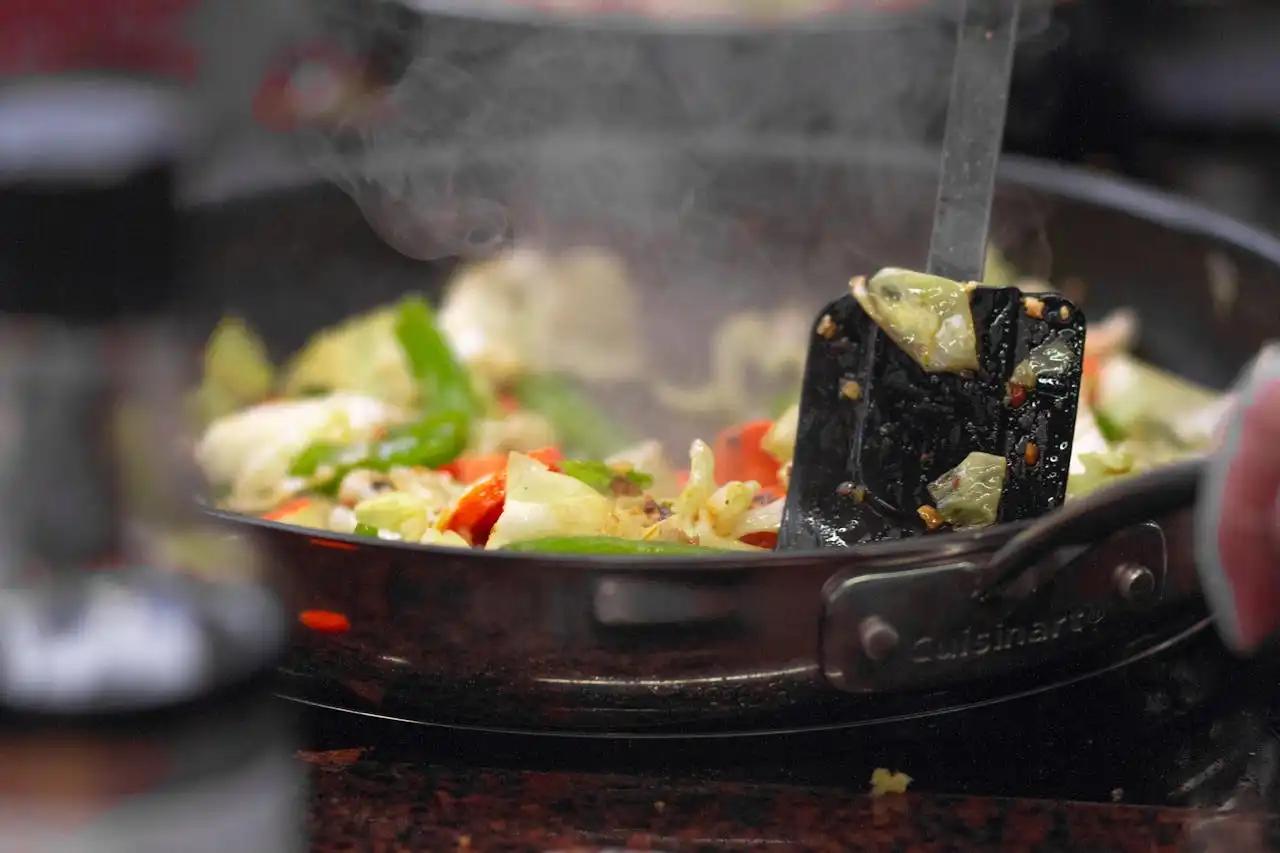Feeling Weak Often? 5 Fatal Mistakes Beginner Vegetarians Often Make
Muhe - Monday, 21 July 2025 | 06:30 PM (WIB)


1. The "Pasta & Bread" Trap: Forgetting Your Protein Powerhouses
This is probably the most common rookie mistake in the vegetarian playbook. You cut out meat, and suddenly, your default meals become endless bowls of pasta, mountains of rice, and a surprising amount of toast. While carbs are awesome for quick energy, relying solely on them without adequate protein is like trying to build a skyscraper with only bricks and no mortar. Protein isn't just for bodybuilders; it's fundamental for building and repairing tissues, making enzymes and hormones, and, crucially, keeping your energy levels stable and you feeling full. Without enough protein, you’ll experience that dreaded mid-afternoon slump, constant hunger pangs, and just a general feeling of being drained. The fix? Get savvy about your plant-based protein sources. We’re talking about legumes (beans, lentils, chickpeas – your absolute best friends!), tofu, tempeh, seitan, edamame, quinoa, and a fantastic array of nuts and seeds. Sprinkle chia seeds into your yogurt, toss lentils into your soup, make a killer tofu scramble for breakfast, or whip up a hearty bean chili. Aim to include a good protein source at every meal, not just as an afterthought. Trust me, your body will thank you by not crashing and burning before dinner.2. Forgetting the Iron: Anemia is No Joke
Feeling perpetually chilly, easily out of breath, or like your brain is swimming through treacle? You might be experiencing the effects of low iron, a common issue, especially for vegetarian women. While plant foods contain iron (non-heme iron), it's not absorbed as readily as the iron found in meat (heme iron). This doesn’t mean you’re doomed to low energy, but it does mean you need to be a little smarter about how you get your iron fix. Spinach and kale aren't just for Popeye; they’re loaded with iron. So are lentils, beans, fortified cereals, dried fruits (like apricots and raisins), and pumpkin seeds. But here's the game-changer, folks: always, always, *always* pair your plant-based iron sources with Vitamin C. Vitamin C acts like a little VIP escort, significantly boosting the absorption of non-heme iron. So, squeeze some lemon over your spinach, add bell peppers to your bean chili, or have an orange with your fortified oatmeal. This simple trick can make a monumental difference in your energy levels and overall vitality.3. The Vitamin B12 Blind Spot: Crucial for Nerve Health and Energy
This one's a real head-scratcher for many newbies because, let's be real, B12 is primarily found in animal products. As in, almost exclusively. And unlike iron or protein, your body can’t just whip it up out of thin air. Vitamin B12 is absolutely vital for nerve function, DNA synthesis, and the formation of red blood cells, which carry oxygen around your body. Without it, you're looking at fatigue, weakness, nerve damage, and potentially more serious issues down the line. So, what’s a vegetarian to do? Fortified foods are your first line of defense: think fortified plant milks (almond, soy, oat), breakfast cereals, and nutritional yeast (which, by the way, tastes suspiciously like cheese and is amazing on popcorn). However, for most long-term vegetarians, especially those who avoid all animal products (vegans), B12 supplementation is often not just a good idea but a necessary one. Don't just wing it and hope for the best; talk to a healthcare professional or a registered dietitian who specializes in plant-based nutrition to figure out the right dosage for you. This isn’t a nutrient to gamble with!4. Ignoring the Omega-3s: Brain and Heart Health Need Love Too
When people think omega-3s, they often think fish oil, right? And for good reason – fish are packed with DHA and EPA, the types of omega-3s most readily used by our bodies for brain health, heart health, and reducing inflammation. While plants provide ALA (alpha-linolenic acid), another type of omega-3, our bodies are notoriously inefficient at converting it into those super-useful DHA and EPA forms. This oversight can leave you feeling foggy, forgetful, and generally not as sharp as you could be. Don't despair! You can absolutely get your ALA from plant sources. Chia seeds, flax seeds (ground for better absorption!), walnuts, and hemp seeds are fantastic sources. Sprinkle them into smoothies, oatmeal, or salads daily. To ensure you're getting enough DHA and EPA directly, many vegetarians and vegans opt for an algal oil supplement. Yes, algae! It's where fish get their omega-3s from anyway, so you’re going straight to the source. Including these healthy fats is crucial for feeling vibrant, mentally clear, and protecting your long-term health.5. Not Eating Enough: The Calorie & Nutrient Deficit
This might sound counterintuitive. "I'm eating all the time, but I'm still tired!" Here’s the scoop: many plant-based foods, especially fruits and vegetables, are incredibly nutrient-dense but relatively low in calories compared to their animal counterparts. If you simply remove meat and dairy without intentionally replacing those calories with other nutrient-rich, calorie-dense plant foods, you can easily end up in a calorie deficit. And when your body isn't getting enough fuel, it’s going to conserve energy, leaving you feeling sluggish, weak, and perpetually hungry. The solution isn’t to just eat *more* pasta (see mistake #1!). It's about eating *smarter* and *enough*. Incorporate healthy fats like avocado, nuts, seeds, and olive oil into your meals. Don't be shy with portion sizes of whole grains, legumes, and starchy vegetables like potatoes and sweet potatoes. Smoothies are a great way to pack in a lot of nutrients and calories efficiently. Listen to your body – if it's rumbling, feed it! And perhaps more often than you used to. Sometimes, feeling weak is simply your body whispering (or shouting!) for more fuel to keep all those amazing systems running. Becoming a vibrant, energized vegetarian isn't just about what you cut out; it's about what you enthusiastically put in. By being mindful of these five common mistakes, you can truly unlock the incredible potential of a plant-based diet. It's a journey, and like any journey worth taking, it requires a little planning and a willingness to learn. But with the right knowledge, you'll be well on your way to feeling strong, healthy, and absolutely amazing.
Your Weekend Won't Recharge Itself: A Guide to Crushing the Energy Reset
6 months ago

The Hidden Horrors of Tear Gas: More Than Just a Fleeting Sting
6 months ago

1312: The Meaning, Origin, and Social Context of the Notorious Number
6 months ago

The Digital Tightrope: How Social Media Puts a "Double Burden" on Today's Teens
6 months ago

Say Goodbye to Awkward Texts: WhatsApp Unveils Your New AI Writing Coach
6 months ago

The Secret Weapon of Penguins: Why Their Poop is More Impressive Than You Think
6 months ago

NVIDIA Crushes New Record, Yet Market Concerns Still Exist Over "AI Bubble"
6 months ago

Your Cosmic DNA? Unpacking How Zodiac Signs Shape Who We Are
6 months ago

The Siren Song of Easy Money: Why We Can't Resist
6 months ago

Unplug and Recharge: Your Guide to Escaping the Gadget Grip
6 months ago
